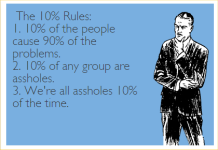lpetrich
Contributor
've finished reading the book "The Fall of the House of Dixie: The Civil War and the Social Revolution That Transformed the South". It's excellent. I find it especially curious how the plantation-slaveowner elite reacted to the war. It was a war waged on their behalf, a war waged so that they could continue owning slaves. But after the first few months to a year, they could not be bothered to do much to support the war effort. They exempted their sons from the military draft with the "Twenty Negro Law", they were not willing to grow much grain or sell it at low prices, and they were not willing to hire out their slaves for tasks like building fortifications. The poorer Confederate citizens ended up grumbling that they were fighting for people who were clearly not doing as much as they could. "A rich man's war and a poor man's fight." That sentiment was especially strong in parts of the South with relatively few slaves. Western Virginians succeeded in seceding from their state, but eastern Tennesseeans' attempt to do so was crushed by the Confederate Army.
Consider the case of plantation owner and slavery defender James Henry Hammond. He argued that the slaves were very suited for doing the work that they were made to do, that they were better off enslaved than free, and that higher civilization rests on the labors of an underclass of people that never get much for their labor -- the "mudsill theory" of society. But when a Confederate army officer stopped by to requisition some grain, he tore up the requisition order, tossed it out a window, and wrote about it that it compensated him too little, and that it was like
branding on my forehead
SLAVE
Consider the case of plantation owner and slavery defender James Henry Hammond. He argued that the slaves were very suited for doing the work that they were made to do, that they were better off enslaved than free, and that higher civilization rests on the labors of an underclass of people that never get much for their labor -- the "mudsill theory" of society. But when a Confederate army officer stopped by to requisition some grain, he tore up the requisition order, tossed it out a window, and wrote about it that it compensated him too little, and that it was like
branding on my forehead
SLAVE

